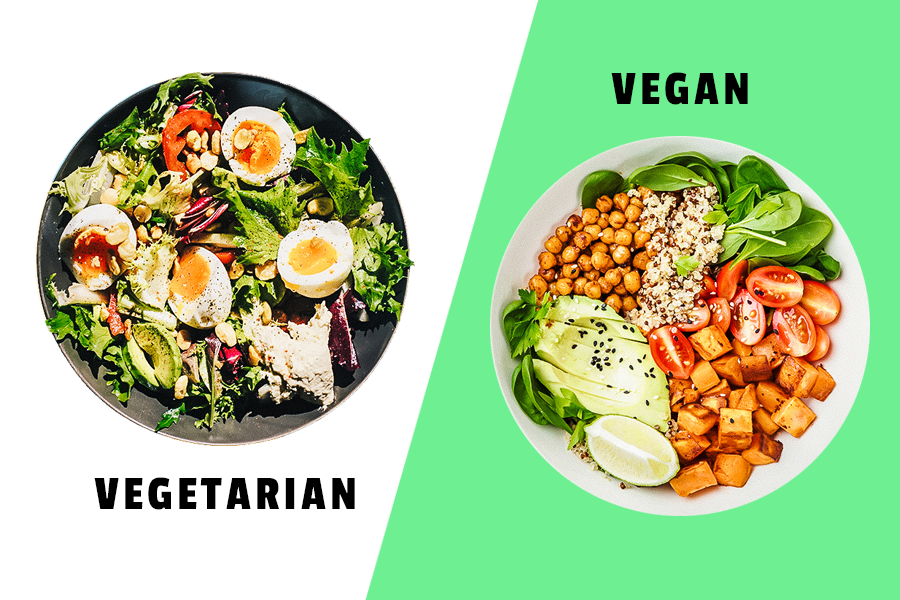Read Our Latest Blogs
Read about science-backed fitness facts, healthy eating habits, workout tips and tricks, nutritional foods, and more. Your one-stop shop to stay updated with in-vogue fitness trends.


By the end of 2021, nearly 80 million people identified as vegans. On the other hand, roughly 22% of the world's population admits to being a vegetarian. So, what exactly is veganism? Is it similar to vegetarianism? Well, the answer is no! Even though having similar characteristics, vegans have stricter resistance towards animal-based products. In simple words, Vegans do not consume food products that originate from animals and refrain from consuming products like dairy by-products, meat, eggs, etc. However, vegetarians, on the other hand, are a bit lenient with their preferences. While they abstain from consuming animal flesh, products like milk, eggs, and honey, do not make it to their list of restricted food items. Despite the differences in their food preferences, Vegans and Vegetarians face the same problem; a lack of protein intake. They have significantly lower levels of protein as compared to omnivores. Now, let us understand the need for good protein levels in the human body. Also known as the 'bodybuilding' nutrient, proteins are crucial for optimum growth and development. To define it in simple words, it is a powerful fuel responsible for maintaining your muscles, skin, hair, nails, bones, eyes, and other organs. Moreover, it also generates antibodies, regulates fat metabolism, and maintains blood sugar levels. Fascinating, isn't it?
Being a vegan or vegetarian can be challenging. As experts and pieces of evidence say, a vegan or a vegetarian diet can lead to nutrient deficiency, especially protein. One of the significant reasons is that the sources of protein intake are less, but don't worry, there is a silver lining in the cloud. Multiple plant-based products sufficiently raise the protein levels in one's body.
So, aren't vegans low on protein?
If you are a vegan, there is a high probability that you must have heard this question at least once in your life. But that's okay! People are often unaware of the protein-rich plant-based food available around them. To help solve your dilemma, we have curated a mini-list for you. Following are a few protein-rich foods that vegans can consume without apprehensions.
a. Quinoa
It generates edible seeds rich in proteins and fiber. A cup full of 185 grams of quinoa seeds provides 8 grams of protein. In addition, it is also a good source of macro-nutrients like zinc, magnesium, etc.
b. Tofu
A worthy substitute for meat, tofu contains adequate proteins. This versatile food product is gluten-free and provides 14 grams of proteins for a serving of 80 grams. While it is known for not having an inherent taste, it absorbs the flavor of cooking ingredients.
c. Buckwheat
This food product boasts ample numbers in amino acid profile. This quality makes it possess high-quality and adequate protein. For an average of 168 grams of Buckwheat hulled seeds, 5.68 grams of protein is served to the body.
d. Lentils
One of the most common food products in Indian households, lentils are rich in proteins, fibers, and vitamins. A cup of 100 grams of serving is enough to fuel you with 9 grams of protein. A bonus fact, lentils are also famous for their cholesterol-free properties.
e. Nuts & Seeds
Multiple seeds like sunflower, flax, hemp, sesame, etc., are a rich source of proteins that also boast other essential nutrients like iron, zinc, magnesium, folate, etc. On the other hand, certain high-protein nuts, like almonds, pistachio, peanuts, hazelnuts, etc., make up for the missing protein consumption.
Most of the food products we have included in a vegan's food list for protein intake are fit for a vegetarian's consumption. However, vegetarians have more options for protein-dense foods. Following are a few additional food recommendations that vegetarians can include in their food diet.
a. Yogurt
Greek yogurts are one of the most-consumed protein-rich dairy products. For an average bowl of 100 grams of yogurt, as much as 10 grams of protein will enrich your body. Furthermore, yogurt is also rich in vital nutrients like calcium, magnesium, and vitamins.
b. Cheese
Cheese varieties like Mozzarella, Feta, Blue cheese, ricotta, etc., are also significantly high in proteins. The best part is, along with high protein levels, cheese varieties are famous for their probiotic properties. With Cheese, you get good gut health and better immunity as well.
c. Eggs
A not-so-surprising entry on the list, eggs are famous for their high protein intake. In one little package, you get approximately 13 grams of protein. Contrary to mass assumptions, the yellow part, a.k.a yolk, is also rich in proteins, albeit not as much as its white neighbor. But that shouldn't be a limitation, as the egg, in its entirety, is a protein powerhouse.
While veganism and vegetarianism are noble deeds to prevent the mass slaughter of animals, it is also crucial to maintain the necessary nutrient levels in the body. With a well-balanced diet plan including protein-rich foods, vegans and vegetarians can sustain themselves by achieving the highest fitness levels.
Did you like the article? Subscribe to receive regular updates about our latest articles and take your first step towards healthy living.

Whether you’re looking for a way to unwind after a hectic day or to enhance your overall fitness, these top 10 exercise...
06 August 2024
The FojFit app is not just a collection of exercises but a comprehensive fitness solution designed to meet your unique p...
30 May 2024
Although many men practice yoga, let's not delude ourselves into thinking that there is even a remote chance of equality...
27 September 2022